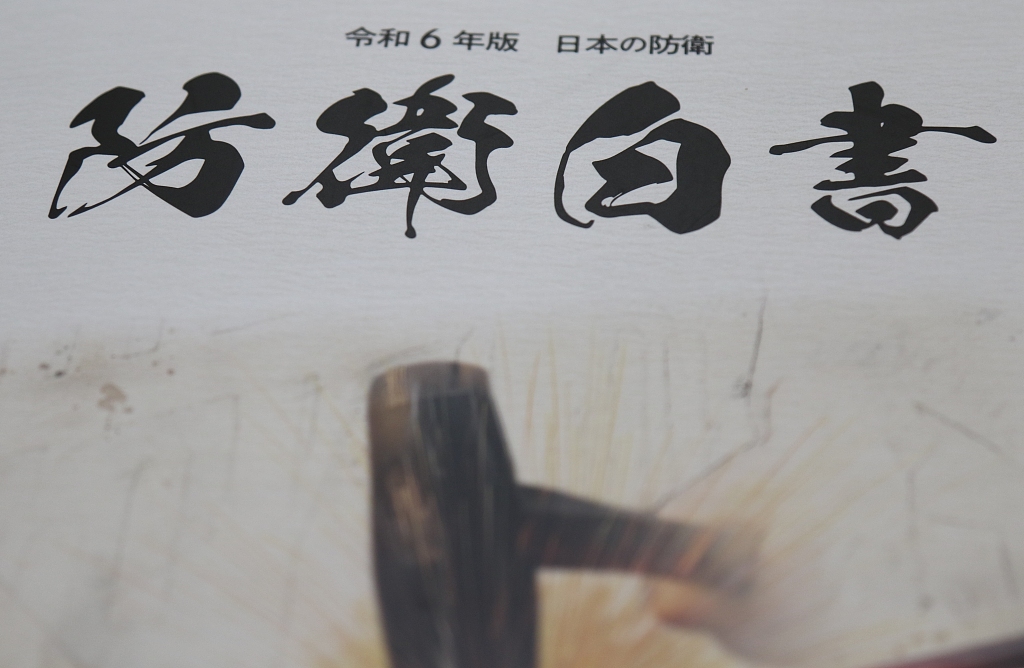
TOKYO – Japan released its 2024 defense white paper on Friday, pursuing a policy of strengthening its own military power by making a big fuss about the "China threat", which is in line with the wishes of the United States, experts said.
According to the white paper, total expenses for Japan's Defense Buildup Program and complementary initiatives for the 2024 fiscal year amount to 8.9 trillion yen ($56 billion), approximately 1.6 percent of the country's gross domestic product at the time its National Security Strategy was formulated in 2022.
The government of Japan allocated 7,724.9 billion yen on an annual expenditure basis, up 17 percent from the previous fiscal year. It also set aside 9,362.5 billion yen on a contract basis, an increase of 4.6 percent year-on-year, to soon start equipment procurement and Self-Defense Forces facility development in a process extending across several years, said the white paper.
READ MORE: S. Korea protests against Japan's territorial claims to disputed islets
The Japanese Ministry of Defense said tax measures, which will be levied on corporate, income and tobacco resources, will be implemented gradually over several years to secure financial resources for the military buildup.
We urge Japan to deeply reflect on the crimes of aggression it has made in history, stick to a path of peaceful development and stop finding excuses for strengthening its military forces.
Lin Jian, Spokesman, Foreign Ministry, China
The white paper seeks to justify Japan's military buildup by pointing to China's military trends, including recent activities related to Taiwan and improved combat capabilities.
Beijing said on Friday that it was strongly dissatisfied and resolutely opposed to the Japanese defense white paper for 2024, and urged Tokyo to follow a path of peaceful development and not make excuses for a military buildup.
Chinese Foreign Ministry spokesman Lin Jian said at a regular news briefing that the white paper "gravely interferes in China's internal affairs, again seeks to play up the 'China threat' narrative, and hypes up regional tensions".
China follows a path of peaceful development, and pursues a national defense policy that is defensive in nature, Lin said.
The spokesman said Japan, which had in the past invaded and exercised colonial rule over Taiwan, is in no position to make unwarranted remarks on the Taiwan question.
"We urge Japan to deeply reflect on the crimes of aggression it has made in history, stick to a path of peaceful development and stop finding excuses for strengthening its military forces," he added.
Masashi Tani, secretary-general of the Tokyo-based Forum for Peace, Human Rights and Environment, said that Japan is exaggerating the issue to a greater extent than necessary in order to strengthen its own military power. By greatly inflating the problem, the Japanese government is building up its military capabilities, which aligns with US wishes.
Huang Xingyuan, representative director of China at the Japan-China Friendship Center in Tokyo, said: "The Japanese defense white paper is also a defense budget book which aims to secure financial resources for Japan's massive military buildup. In fact, it is to create public opinion for Japan to expand its armaments, increase its defense budget and break through certain military constraints."
Additionally, creating an atmosphere of tension in the Taiwan Strait is also orchestrated to distract from domestic issues in Japan. When there are political problems or low government approval ratings, Japan tends to divert conflicts outward, said Huang.
ALSO READ: Japan's defense strategy a flawed 'paper plan', say officials
The approval rating for Japanese Prime Minister Fumio Kishida's Cabinet dropped 0.9 percentage point from the previous month to 15.5 percent in July, marking a new low since Japan's ruling Liberal Democratic Party, or LDP, returned to power in December 2012, a poll conducted by Jiji Press showed. The low approval rating reflects a backlash caused by a slush-fund scandal involving LDP factions.
"To expand its international influence and discourse power in politics and defense, Japan has been creating concepts like a 'China threat' to justify a series of hardline policies," said Huang.
The Japanese government is considering using additional taxes to secure a sufficient budget for strengthening defense capabilities. From a citizen's perspective, there is a very strong aversion to tax hikes, said Tani.
"In reality, the budget needed for large-scale military buildup can only be obtained through tax increases. Because mentioning this would provoke a public backlash, the government is proceeding ambiguously and plans to increase taxes at some point when people have forgotten about it. However, citizens are not that naive," Tani added.
Satoshi Shirai, associate professor specializing in social thought and political science at Kyoto Seika University, said the US is demanding that Japan strengthen its military capabilities to help the US maintain its global hegemony.
Japan's current military buildup focuses more on purchasing US-made weapons, which also reveals the subservience to the US present in the Japanese government and political circles, Shirai added.
Wang Qingyun in Beijing contributed to this story.


